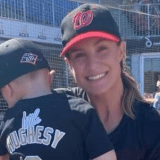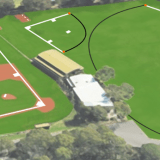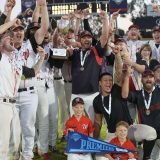
Richard (Dick) Mason was born on the 28th. March 1938, the second son and third child of Richard and Gwen Mason.
Dick’s mother was the organist at St. Mark’s High Church of England, Fitzroy and she installed in him at an early age a love of music. Fortunately Dick had an excellent “Bell Soprano” voice and was chosen for the St. Paul’s Cathedral choir, which resulted in him gaining a scholarship to Trinity Grammar School where he made the most of the opportunity to develop a superb command of the English language, which he would use though out his adult life.
At age sixteen Dick chose to go into radio broadcasting as his life career. His first appointment was in commercial radio in Launceston and later at Mildura before joining the ABC in 1960.
His career path together with an arm injury cut short Dick’s playing career in baseball. He had commenced playing with the East Brunswick club and enjoyed his passion for the game until his move to Tasmania.
Following his return to Melbourne where he joined the ABC, Dick became involved in basketball as a referee and later as an administrator. He served as a vice president of the Victorian Basketball Association for 10 years and was also supervisor of referees. He was regarded as one of the best referees in the country. He was made a life member of that Association.
It was probably during this time that his passion for baseball was reignited. He would have been in regular contact with John Frecker, a fellow referee, who was also the Treasurer of the Waverley Baseball Club having been one of the Glen Waverley RSL members who started and fostered the club in its early years.
Dick enthusiastically launched himself into the Waverley junior program when it began in the 1960s and helped make it one of the most admired junior programs in Australia.
He became the freely acknowledged best coach in Pee Wee baseball and enjoyed considerable success in that role both with the club and on the National level. He spent seven years as the Victorian under 13 head coach winning four national titles.
Many people considered him rigid, inflexible and very demanding. This was not true. Certainly he would not countenance a fool nor would he accept second best from his players. However, his coaching knowledge and style was continually changing as he absorbed all the literature on the game that he could get hold of as well as making regular trips to the USA to further his knowledge of the latest coaching techniques. He made several trips to Georgia Southern College, regarded as one of the top baseball colleges, to work with their coach Jack Stallings. He always brought this knowledge back to Waverley.
An example of his approach was that as the State Coach, he had to teach the opposition players the best techniques. This meant that he had to work harder and better the next year to maintain Waverley’s position as the number one club.
Dick not only worked with the juniors but also served on the club’s board of management for 12 years. He was made a life member of the club in 1974.
Dick was appointed Head Coach of the club in 1978 and introduced a new approach to training and the methods used to develop the skills of the players. This resulted in WBC winning its first Division 1 premiership in 1980-81 and the first of seven consecutive Club Championships.
It should have been the start of an era but unfortunately the Commonwealth Games were scheduled for 1982 in Brisbane and Dick was transferred to Brisbane to plan and implement the ABC’s role as broadcasters and televisors of the event.
On his return to Melbourne Dick again became involved with coaching, assisting Phil Dale in winning our third and fourth Division 1 flags.
A visible record of his coaching achievements is shown by the list of more than 50 Waverley players he helped mold that made state junior and senior sides including Claxton Shield representatives and the many that made the Australian teams.
Apart from his work with WBC Dick also served for some 10 years on the Victorian Baseball Junior League committee.
During his short lifetime Dick accumulated a wealth of knowledge of all sports, which, when added to his voice, vocabulary and personality made him one of Australia’s most forthright and colourful sporting commentators.
All who worked with him whether in radio, baseball or sport in general respected the man, his skills and knowledge
He was awarded the Order of Australia Medal for services to sport and radio.
His sudden death during heart surgery, which the day before, he described as “a little internal plumbing” robbed our sport and the Waverley Baseball Club in particular of a great worker and pursuer of excellence.
Our thanks to Keith Sheldon-Collins for writing this tribute to his “baseball colleague” and good friend, Dick Mason.







